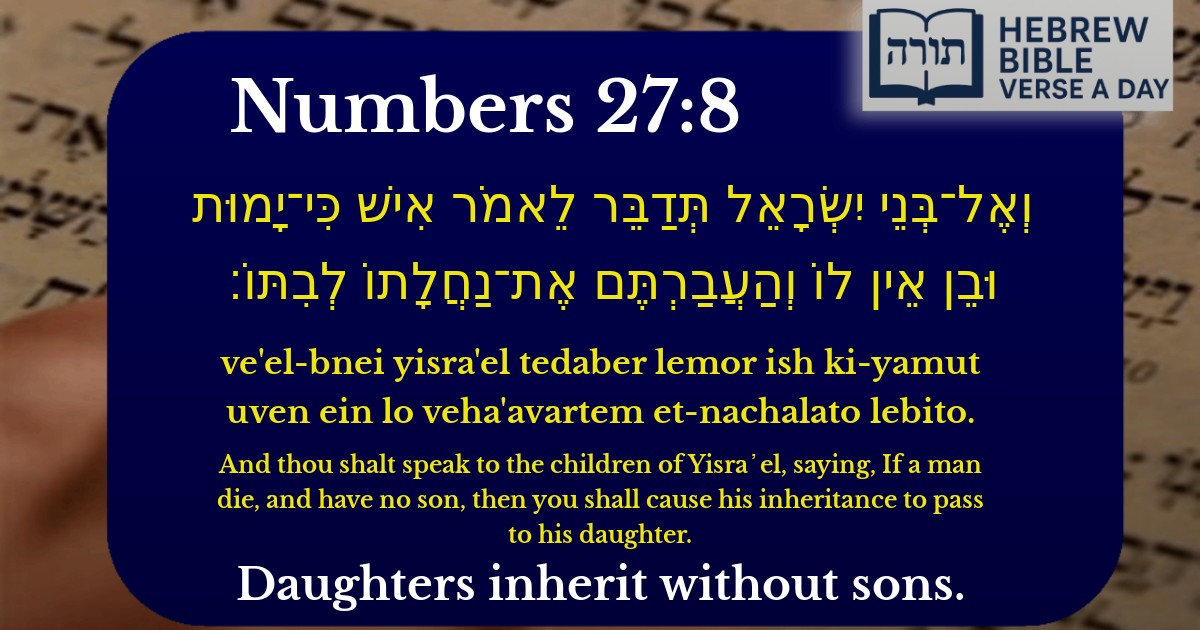Join Our Newsletter To Be Informed When New Videos Are Posted
Join the thousands of fellow Studends who rely on our videos to learn how to read the bible in Hebrew for free!
Hebrew Text
וְאֶל־בְּנֵי יִשְׂרָאֵל תְּדַבֵּר לֵאמֹר אִישׁ כִּי־יָמוּת וּבֵן אֵין לוֹ וְהַעֲבַרְתֶּם אֶת־נַחֲלָתוֹ לְבִתּוֹ׃
English Translation
And thou shalt speak to the children of Yisra᾽el, saying, If a man die, and have no son, then you shall cause his inheritance to pass to his daughter.
Transliteration
Ve'el-bnei yisra'el tedaber lemor ish ki-yamut uven ein lo veha'avartem et-nachalato lebito.
Hebrew Leining Text
וְאֶל־בְּנֵ֥י יִשְׂרָאֵ֖ל תְּדַבֵּ֣ר לֵאמֹ֑ר אִ֣ישׁ כִּֽי־יָמ֗וּת וּבֵן֙ אֵ֣ין ל֔וֹ וְהַֽעֲבַרְתֶּ֥ם אֶת־נַחֲלָת֖וֹ לְבִתּֽוֹ׃
וְאֶל־בְּנֵ֥י יִשְׂרָאֵ֖ל תְּדַבֵּ֣ר לֵאמֹ֑ר אִ֣ישׁ כִּֽי־יָמ֗וּת וּבֵן֙ אֵ֣ין ל֔וֹ וְהַֽעֲבַרְתֶּ֥ם אֶת־נַחֲלָת֖וֹ לְבִתּֽוֹ׃
🎵 Listen to leining
Parasha Commentary
📚 Talmud Citations
This verse is quoted in the Talmud.
📖 Bava Batra 111b
The verse is discussed in the context of inheritance laws, specifically regarding the transfer of inheritance to a daughter when there is no son.
📖 Sanhedrin 52a
The verse is referenced in a discussion about the laws of inheritance and the rights of daughters in the absence of sons.


Inheritance Laws for Daughters
The verse (Bamidbar 27:8) establishes the halachic principle that when a man dies without leaving a son, his daughter inherits his property. This is part of the Torah's detailed system of inheritance laws, which prioritize keeping land within the family and tribe.
Rashi's Explanation
Rashi explains that this verse comes in response to the daughters of Tzelofchad's petition (earlier in the chapter), showing that Hashem affirmed their claim. The sequence teaches that the daughters' right to inherit was part of the Divine plan all along.
Hierarchy of Inheritance
The Talmud (Bava Basra 115b) elaborates on the full order of inheritance:
Purpose of These Laws
The Rambam (Hilchos Nachalos 1:1-3) explains that these laws serve multiple purposes:
Daughters as Primary Heirs
The Midrash (Bamidbar Rabbah 21:10) notes the revolutionary nature of this law in the ancient world, where daughters were typically excluded from inheritance. The Torah's approach demonstrates its concern for justice and the rights of women in the family structure.
Conditions and Limitations
The Talmud (Bava Basra 111b) discusses that this inheritance right applies specifically to ancestral land in Eretz Yisrael. For other property, different rules may apply. Also, the daughter must be unmarried at the time of her father's death to inherit directly.